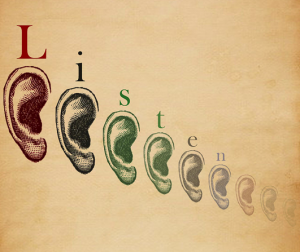GOOD LISTENING HABITS
1. Listen carefully for important facts
2. Being open-minded to the subject
3. Avoid disputing opinions, discuss facts
4. Taking a chance to get ideas from the material that the speaker prepared
5. Eliminates distraction and focus on the message
6. Highlight main points and listen to the rest of the message
POOR LISTENING HABITS
1. Criticizing the speaker by thinking that he/she has nothing important to say
2. Disagree on ideas and facts
3. Giving fake attention and think about something else rather than listening
4 .Get distracted therefore unable to understand what the speaker is trying to say
5. Use of distraction to have a reason not to listen
6. Lack of attention given to the speaker, if the listener finds the subject boring
URL: http://success.oregonstate.edu/listening-habits


